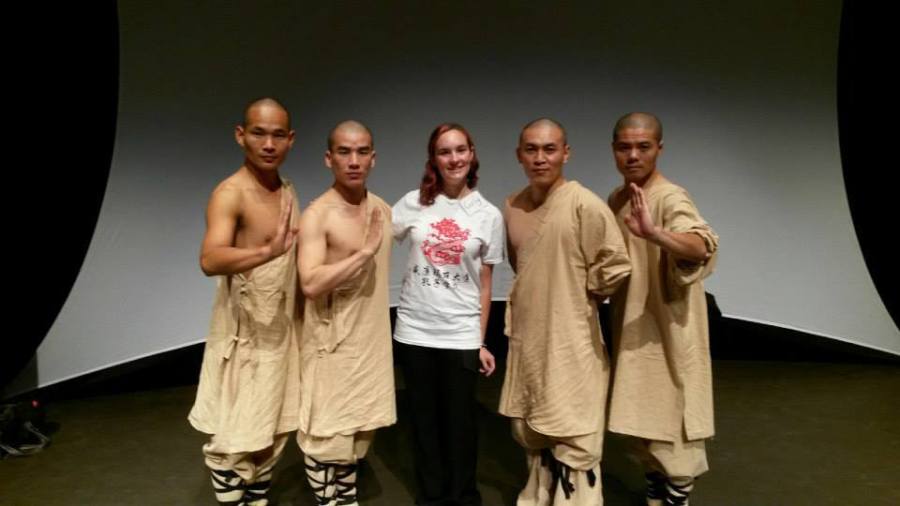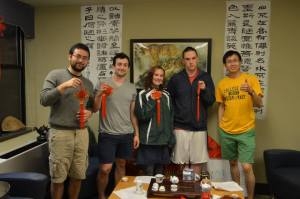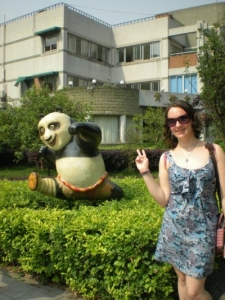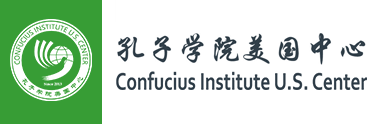Carly O’Connell
Stoking the Fire
By: Carly O’Connell

Learning a language is hard enough, but maintaining it is another battle. Now that I no longer sit in class every day or live immersed in Chinese life, I feel my language ability shrinking like the dying embers of a fire left to burn itself out. Fortunately, the Confucius Institute has been there for me to stoke the fire and rekindle my love and knowledge of Chinese language and culture.
I have studied Chinese for 13 years, in five cities, and with supplemental help from three Confucius Institutes. My journey began in middle school, where my New Jersey public school amazingly offered Chinese as one of our six foreign language options. I chose Mandarin for the challenge it presented as the language most far-removed from my native English. I loved it from the first day, as each building block of new grammar or vocabulary opened more codes to crack and mysteries to explore. I continued through high school and carefully selected a university with a good Chinese program, The College of William & Mary in Williamsburg, Virginia.
 The William & Mary Confucius Institute (WMCI) opened in the spring of my freshman year. The WMCI was almost like a college friend to me as we grew and supported each other over the course of four years. From the very beginning, I was involved. I still remember waving to the college president while holding up the rear end of the dragon dance prop during the opening ceremony. A house tutor provided by the institute lived with us in the Chinese language dorm, hosting cooking classes, tea ceremonies, and conversation hours. Sophomore year, I participated in an immersion program in Beijing. When I came back, I took and passed the HSK 5 test through WMCI. I volunteered with them at every opportunity, including acting as a bilingual emcee for their big Chinese New Year gala when I was a junior. Finally, I joined the institute in an official capacity as an intern my senior year.
The William & Mary Confucius Institute (WMCI) opened in the spring of my freshman year. The WMCI was almost like a college friend to me as we grew and supported each other over the course of four years. From the very beginning, I was involved. I still remember waving to the college president while holding up the rear end of the dragon dance prop during the opening ceremony. A house tutor provided by the institute lived with us in the Chinese language dorm, hosting cooking classes, tea ceremonies, and conversation hours. Sophomore year, I participated in an immersion program in Beijing. When I came back, I took and passed the HSK 5 test through WMCI. I volunteered with them at every opportunity, including acting as a bilingual emcee for their big Chinese New Year gala when I was a junior. Finally, I joined the institute in an official capacity as an intern my senior year.
As a Confucius Institute intern, I gained some of my first journalistic experience reporting for the WMCI newsletter. My proofreading skills were carefully honed as all English documents produced by staff passed through me on their way out the door. I now make a living using these writing and editing skills as a communications professional. The absolute coolest task that I had as an intern was to personally greet a contingent of Shaolin Monks, whom WMCI had arranged to perform at the college!
Upon graduation, I fulfilled the purpose that it seemed I had been training for all these years: I moved to Changzhou, China, for a year to teach English while fully immersing myself in the country I had studied for so long. When I returned to America, I was not quite sure what my next step was. I moved to Washington, D.C., and tried out a variety of jobs, some of which utilized my Chinese language skills and some of which did not.
 As a temporary assistant in George Washington University’s International Services Office, I was asked to give a short speech in Chinese at the international student orientation to help the largest contingent of foreign students feel welcome. Next, at a small law office specializing in immigration and international matters, I translated emails in legalese back and forth between my English-speaking colleague and a Chinese client. Let me tell you, that kept my mind sharp!
As a temporary assistant in George Washington University’s International Services Office, I was asked to give a short speech in Chinese at the international student orientation to help the largest contingent of foreign students feel welcome. Next, at a small law office specializing in immigration and international matters, I translated emails in legalese back and forth between my English-speaking colleague and a Chinese client. Let me tell you, that kept my mind sharp!
Eventually, I realized my passion was for bringing people of different cultures together, to open minds and spread tolerance. I wanted others to have the same opportunities I had to see that the world is a bigger place than our own hometowns, but that even people who live across the world have more in common with us than differences. Those realizations led me to the field of international education.
I started work at a higher education organization that allowed me to use and learn a lot of great skills, unfortunately none of which was Chinese. I felt like something was missing. An aspect of my life that had been with me since that first day of sixth grade was now gone, but I couldn’t let those years of study go to waste, like a muscle atrophied from lack of use.
Luckily for me, there are two wonderful Confucius Institutes right in the heart of D.C. I began attending a Chinese language “salon” at the Confucius Institute U.S. Center, a semi-monthly meetup for advanced speakers to read and discuss news articles and contemporary issues. For Chinese New Year last year, I attended an event at the George Washington University Confucius Institute, where I saw a truly epic traditional Chinese dance to the Game of Thrones theme song. I now participate in a biweekly Chinese Corner conversation hour at that same institute. I even ran into an old classmate from my William & Mary days during the first session.
I am eternally grateful to the William & Mary Confucius Institute, the Confucius Institute U.S. Center, and the George Washington University Confucius Institute for catching me when I was falling out of the habit of practicing Chinese and putting me back on my feet. Whenever I step into one of these buildings, I know I am about to feel my passion for the subject resurge and to meet others who share that passion with me. These institutes and their staff have been such an amazing resource for me over the past seven years. Wherever I go, I know the Confucius Institute has my back. That’s why I wrote this essay to say: 非常感谢你们!
Carly O’Connell
Confucius Institue at George Washington University and the College of William & Mary
Public Affairs Associate
Arlington, Virginia
Carly is a young professional working in higher education. She began studying Chinese in sixth grade and has made it a major part of her life ever since.
Carly attended the College of William & Mary where she double-majored in Chinese and Linguistics. As a student, she participated in a language immersion study abroad program in Beijing and also interned at her campus’s Confucius Institute.
After graduation, she moved to Changzhou, China, for a year to teach English and fully immerse herself in Chinese life. She now lives in Washington, DC, where she attends Chinese conversation practice at George Washington University’s Confucius Institute to keep up her skills.
In the future, she hopes to work in the field of international education, where her Chinese language skills would come in handy when assisting international students or facilitating study abroad programs, and where she can encourage others to pursue eye-opening cross-cultural experiences like those that shaped her own life.

